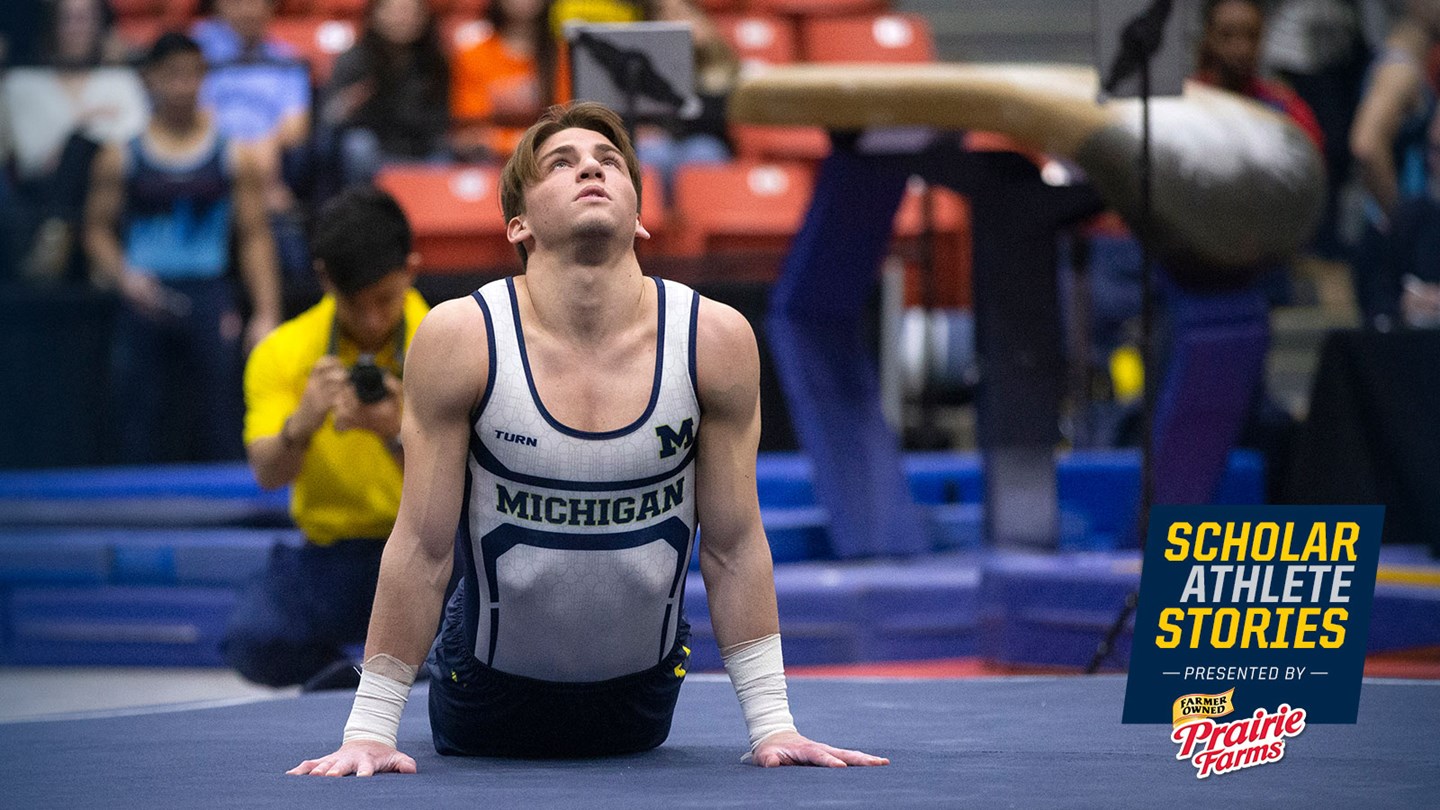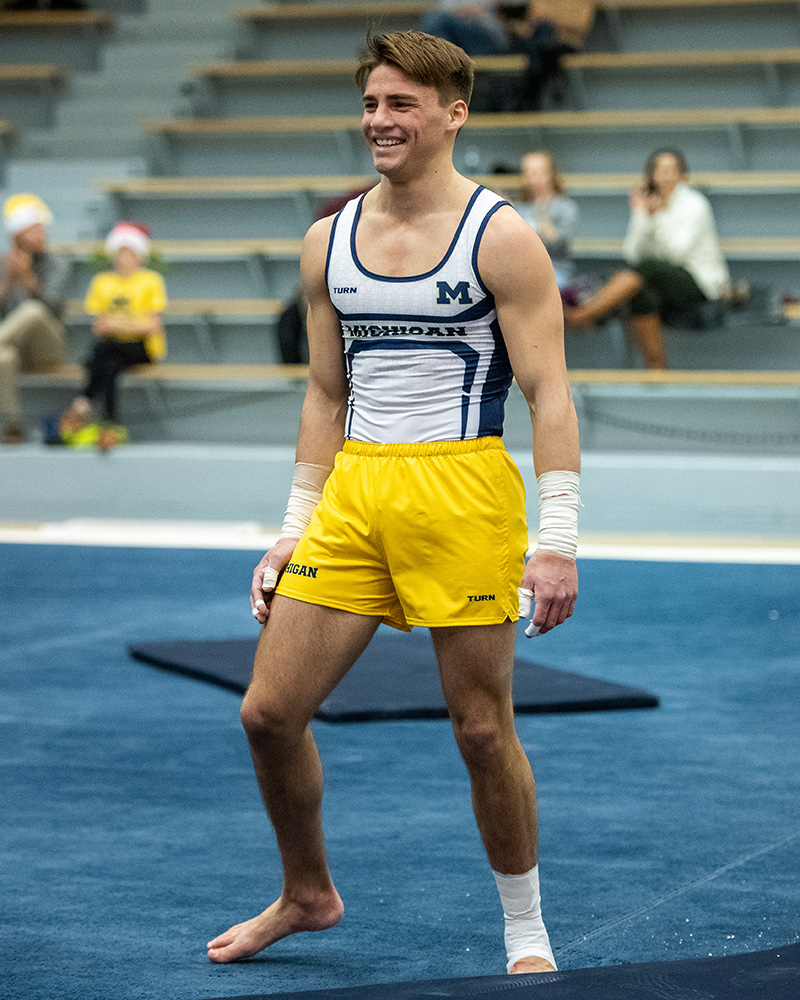Scholar Stories: Gerdov Overcomes Adversity, Injury to Pave Way at Michigan

 Enlarge
Enlarge
For a story with so many layers, it only makes sense to start at the beginning.
Take Alan Gerdov, a junior on the University of Michigan men’s gymnastics team. He is the youngest of three siblings to parents Lyudmila and Gregory, who fled Ukraine in 1989 to escape religious persecution from the Soviet Union.
They took the ultimate chance. If they attempted to leave and their applications were denied, they would have been seen as traitors to society. Finding work would have been incredibly difficult, if not impossible.
Through Israel and then Italy — where Alan’s older brother, Michael, was born — the family immigrated to the United States and eventually settled in Linconshire, Illinois, a northwest suburb of Chicago.
Gerdov went through the entire story last week over a Zoom call from his off-campus residence in Ann Arbor. In the midst of the COVID-19 pandemic, he is still here, choosing to stay instead of going home and potentially putting his parents and his 81-year-old grandmother, Faina, at further risk of catching the virus.
“My parents risked everything to come here,” he said. “Relative to the hardships and adversity they faced, with only $100 to their names and language barriers, the lifestyle we had was pretty normal.”
Adversity is something Gerdov knows plenty about. His gymnastics career has been on-again, off-again due to injuries stemming from a stress fracture in his back as a sophomore in high school. His junior and senior years, he rarely competed because of it.
He got healthy (enough) to join the Michigan program as a walk-on. But when he arrived on campus, Gerdov put the pedal to the metal a little too much. As he said, bluntly: “I burned my body to the ground.”
“It got to a point where I wasn’t able to contribute athletically at all,” he said. “There was this list that (head coach) Kurt (Golder) had, and it was a list of skills that I couldn’t physically do. It showed my limitations.”
“They said, ‘It’s unfortunate you’re injured, but we want you to stay around. Here’s how you do it.’ They asked me if I wanted to be an undergraduate assistant coach. I said yes.”
If there was a silver lining, that was it. Ask the other guys around the gym and they will say that Gerdov is energetic, loud and always positive. There’s a spot on every team for someone like that.
Still, Gerdov felt he had something to prove, specifically to the older members of the team who maybe didn’t want to hear from an unproven, oft-injured freshman.
Over time, his body began to heal. After his sophomore year, Gerdov secured a full-time summer internship with POWER Engineers in Ann Arbor. He had put in his nine hours, then go straight to the gym to work out. He practiced on his own for three hours a day, five days a week.
“It was a lot of self-motivation,” he described. “I missed the sport. My body was healing and I felt I could do a lot of things I couldn’t do before. Some of the guys suggested I have a conversation with Kurt. It was after that that I thought, ‘Maybe I’m doing a good job with this.’ Kurt gave it a chance.”

 Enlarge
Enlarge
And with that, Gerdov came all the way back, competing in four meets this year (all on floor exercise) before the pandemic wiped out the rest of the season. The team was in the middle of an intrasquad competition to determine the lineup for that weekend’s meet when the news came down.
For all the work Gerdov put in to get back on the team, the cancellations were a real punch to the gut. Still, he’s trying to see the bright side.
“It’s kind of funny. Next year, I’ll be a senior and it’ll be my first time fighting for a competition spot at Big Tens and NCAAs,” he joked. “It’s been a colossal game of catch-up. I shot a text out to the freshmen after the season and told them that their hard work didn’t go unnoticed. Lots of things were coming to fruition.”
Family is a driver behind nearly everything Gerdov does. As a kid, while his friends were mostly playing organized team sports, Gerdov was more interested in swimming, tennis and gymnastics. One day, 6-year-old Alan watched Michael do backflips in his backyard and thought, “I want to be like him.”
By age 12, Gerdov knew all about the University of Michigan. His older sister, Nicole, had been accepted and eventually became a graduate of the College of Engineering. But as the years progressed, his love for the sport waned. By his own admission, the passion he is known for now all but disappeared.
“That was a pivotal time in my life,” he explained. “At that time, I was more embarrassed about gymnastics and stopped caring about it. I went to practice and just had a bad attitude. I was painfully negative. If you’re negative, you’ll destroy your own practice and the practices of those around you. I wasn’t helping anyone.”
On one of the family visits, Gerdov competed in a club competition on the Cliff Keen Arena floor. That same weekend, there was a college competition, and it was that atmosphere that reignited the passion.
“After watching that and talking to alumni from my club program, it was almost like a switch flipped,” he said. “You don’t know who you can inspire. Those college students then didn’t know that I was there, that what they did inspired me. Now I’m more passionate than ever before. I religiously study the sport. I daydream about routines — and not just for myself. It turned my career around.”
Because of the familial tie-in, Gerdov came to love Michigan. However, of all the schools he considered for college, Michigan, ironically, recruited him the least. There was a period of time where he felt the best thing to do was to carve his own path and go somewhere else. In the end, it was the school’s academic prestige that drove him to commit.
Like every member of his family, Gerdov is studying to become an engineer, majoring in electrical engineering. He is also pursuing a minor at the Ross School of Business.
He gained an interest in the field simply by listening. When engineering is the dominant topic of discussion at your dinner table, there’s no choice but to listen.
“My brother and sister are electrical engineers. My dad is a mechanical and aerospace engineer. Listening to these people who inspire me every day talk about things I can’t understand, it piqued my interest,” he said. “Slowly, through my own research, I learned more about those conversations and wanted to join in on them.”
“Electrical engineers are essential to industry. Nearly everything in our lives has some kind of electrical component. Engineers are types of people who are passionate about solving problems and making things more efficient.”
Gerdov plans to apply for the Sequential Undergraduate/Graduate Studies (SUGS) program at the Rackham Graduate School in the fall. It is a program for select College of Engineering students to obtain both a bachelor’s degree and master’s degree over a five-year span. Should he be accepted, Gerdov also would have the option of obtaining a fifth year of eligibility.
If all goes according to plan, Gerdov will work for a major utility or power company, or a company like Amazon, Nike or Google. Eventually, he will return to school and get his MBA.
Gerdov has endured several hiccups throughout his journey — one that is still being written. No matter what hardships he faces in the future, the lessons learned from his time at the University of Michigan will undoubtedly serve him well.
“I honestly don’t know what other part of my life has been so significant,” he said. “I’ve been bombarded with adversity. I’m either going to run from it or overcome it. To me, being at Michigan, in a word, means family. If it wasn’t for all the opportunities provided to me by my family, coaching staff and friends, I don’t think I would’ve been able to conjure up what it took for me to get over all those hurdles. Michigan made me the person I am today.”
This story originally published on MGoBlue.com
Photos by Michigan Photography
 MENU
MENU 
